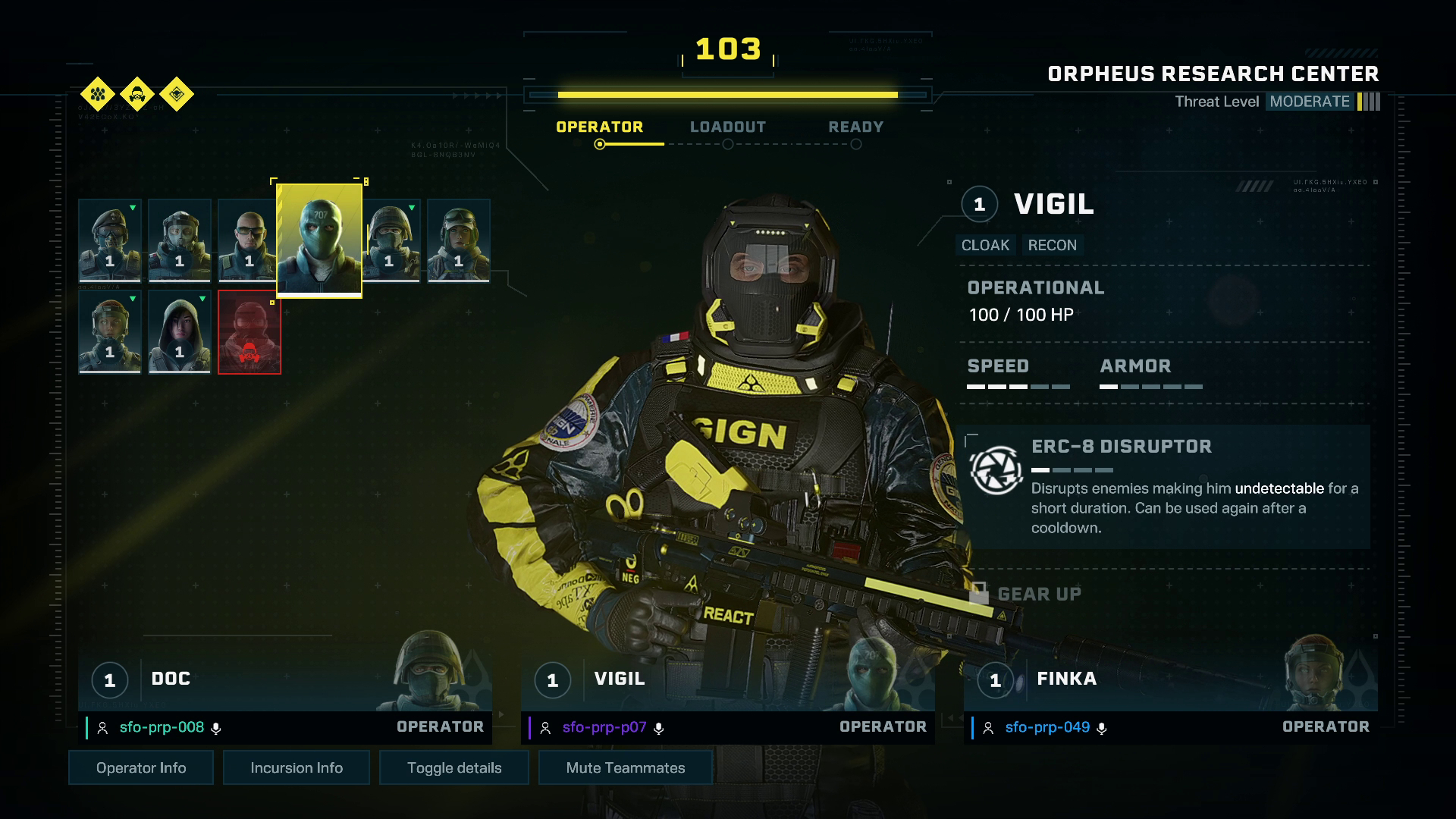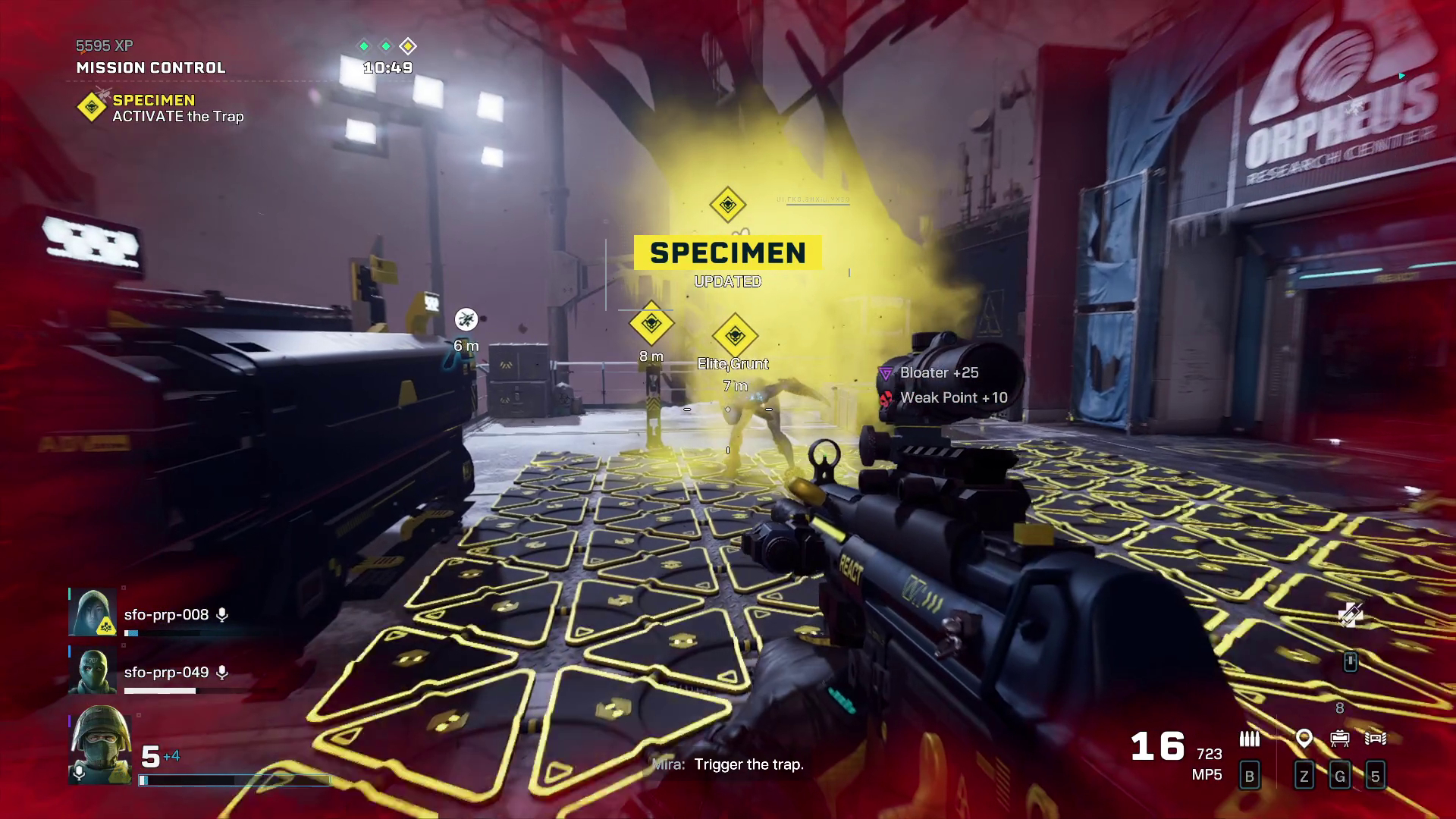Rainbow Six Extraction isn't as Left 4 Dead as I thought it'd be
Extraction is a slower, more methodical take on the co-op zombie slayer.
Watch our video preview above
It feels like ages ago that Rainbow Six Extraction was announced, but I just googled it and it turns out that was only 2019? Time flies in quarantine, especially for a game originally titled "Quarantine." A year before that, Ubisoft proved that a co-op zombie game based on the PvP-focused Rainbow Six Siege could actually work in a time-limited side mode.
That mode was called Outbreak, and it only lasted for a couple of weeks before it disappeared forever. At the time, the fun three-mission campaign gave us major Left 4 Dead vibes. Ubisoft absorbed feedback, formed an entirely new team within its Montreal studio, and got to work to make it real.
After a few hours playing Extraction, I'm starting to think it's actually the anti-Left 4 Dead. It has safe rooms, special infected types, and scarce medkits, but Extraction's pacing is completely different from the chaos I'm used to in co-op zombie slaying.
The mission our group of three played was an almost leisurely stroll with small bursts of action throughout. I never encountered that classic scenario where I'm hurrying down a hallway with 23 zombies (Extraction calls its alien zombies "parasites") behind me in a full-sprint to eat my flesh. I did, however, have to pull Sledge out of a gooey alien cocoon, dodge fleshy scab growths that ambushed from the ceiling, and trudge through black ooze that coats every inch of a room. Rainbow Six Extraction is very gross in a good way.
Snail's pace
Extraction's slower pace can be chalked up to its source material: Rainbow Six Siege. Like Siege, the default speed here is a light jog that's significantly slower than most FPSes. The speed is naturally suited for Siege's close-quarters shootouts, but it feels a bit weird in a zombie game. Maybe that's why the enemy groupings were so sparse. Normal parasite enemies are about as weak as L4D zombies, but they don't bunch up into hordes. I'd often find one or two in a room standing still, waiting patiently to be shot in the head. It's also seemed like it was possible to completely clear out an area by destroying the parasite-spawning nests scattered around. I was surprised at how often I felt relatively safe in this dangerous environment.
So, when exactly is it not safe? That can depend on how well you manage that black ooze I mentioned earlier, the "Sprawl." Nests are constantly pumping out the stuff and standing in it slows you to a crawl, making you an easier target for enemies. I got caught up in the ooze a few times and was promptly pummeled by the basic meandering parasites that had given me no trouble before. Some mission types also seem to be more dangerous than others. My group ended up failing our second mission trying to protect a node as a bunch of parasites pushed us from every direction. We hadn't seen this objective yet and it had been quiet up to that point, so the sudden aggression caught us all off-guard.
Keep up to date with the most important stories and the best deals, as picked by the PC Gamer team.
There are seven special parasite types that can appear in a given mission. L4D veterans will recognize the bloater-type zombie that wants to blow up in your face, but the other ones we fought were more original—a spiker that shoots needles, a trapper that can also blind players, and a rooter that sends out slowing area-of-effect attacks from far away. The variety is pretty impressive, though it's possible only a few types can spawn in a single mission.
It was hard to tell from only a few playthroughs of one mission, but I got the sense that these "special" parasites are pretty common spawns that might even appear as often as a standard meandering parasite. Similar to Siege, operators are fragile. Instead of my HP slowly chipping away after a dozen swipes from L4D zombies, I'd be on the ropes after only two or three scrapes.
Luck also has a small part in a mission's difficulty. Enemy types, mission objectives, and where those objectives appear are procedurally generated. Every map is divided into three "sub-maps" with layouts that don't change, but the order that they appear in do—the lab environment our mission started in could be the last area in your run, for instance. The only variable that really mattered to our group were the objectives themselves, which are picked from a pool of 12. Sometimes we had to destroy noxious nests while parasites continuously spawned or lure a superpowered alien into a trap. One time we had to carry special foam injectors capsules into an alien node to foam it up and destroy it, which was neat. Completing all three objectives in each of the sub-maps nets the most experience points (working toward a progression system that Ubi wouldn't talk about), but you have the option to extract early instead of pressing on.
Extracting early ensures that your operator doesn't go down, which you really want to avoid thanks to Extraction's "MIA" mechanic. Lost allies are captured by the parasite and can't be played again until you've rescued them in a subsequent mission (that's the "gooey alien cocoon" I mentioned earlier). Health also carries over after a mission, meaning that a Doc that barely survived with 10 HP has to sit out a few missions before he's back to full health.
It's hard to tell how this system will play out once the whole game is in front of me, but I really don't like it so far. Locking out operators struck me as an arbitrary punishment that didn't meaningfully change the game—not having Sledge or Doc doesn't mean getting around the map is more challenging or some enemies are harder to counter, it's just an inconvenience to have fewer options on the character select screen. It also sounds annoying to have to repeat the same cocoon extraction mission anytime I or one of my squadmates has an operator in need of saving. We did it a few times in the demo and I got pretty tired of doing the same tug-of-war match with an alien tree. Maybe losing a character will be rarer than our demo suggested, but it was pretty easy to go down at our intermediate difficulty.

Old dogs, new tricks
Speaking of operators, all of Extraction's come straight from Siege. We had access to a pool of nine: Alibi, Finka, Sledge, Lion, Doc, Pulse, Hibana, Vigil, and Ela. It's clear that Ubi has plucked operators whose gadgets already make some sort of sense in a PvE environment. Doc's healing pistol, Sledge's hammer, and Ela's Grzmot mines handle exactly the same as they do in Siege with minor tweaks (Doc's pistol doesn't heal nearly as much in Extraction, but it can still be used to revive allies from far away).
In a few cases, the function of a gadget has had to be changed entirely. Vigil's jammer backpack usually allows him to appear invisible on cameras, but in Extraction he becomes undetectable to parasites temporarily. Instead of detecting heartbeats, Pulse's cardiac sensor can sniff out nests through walls. I was excited to see how Ubi would incorporate these gadgets into a co-op game since Extraction's announcement, though I was disappointed at how superfluous my operator abilities were in action. In Siege, gadgets give every operator a distinct role on a team—Hibana can open crucial reinforced walls, Pulse can surveil opponents through anything, Alibi can play tricks with decoys. Extraction turns all of these multifaceted tools into somewhat minor perks. Doc's dinky healing output is trounced by proper medkits, Vigil's scrambler makes stealth slightly easier, and Sledge's hammer feels trivial when any operator can bring impact grenades.

Extraction just doesn't seem very interested in gadgets, and Siege's impressive destruction engine seems to take a backseat, too. Most rooms have at least one destructible wall, but breaching wasn't really encouraged or required to get through our missions. One of the few wholly new gadgets I saw was the UV flashlight attached to every gun in the game that reveals parasites through walls and highlights weak points. It felt pretty cool to x-ray a wall and kill everything behind it without breaking a sweat.
I'm interested to see what other types of variables can be thrown in to make missions feel unique. There are so many fundamental unknowns that'll inform how replayable the game is—Ubi wouldn't comment on details like the total number of maps, how the campaign works (it has one apparently), operator count, and anything about progression.
Right now, the best thing Extraction has going for it is that I already know it's a good FPS. Armed with Siege's precise hitboxes and distinctive gun feel, Extraction is stepping out of the gate with a major gameplay advantage that a smaller-scale co-op shooter like Back 4 Blood can't match. Extraction feels expensive, which is only one aspect of the game, but is very important in an FPS that you're supposed to play over and over again.
It feels weird to play a game that looks, sounds, and feels just like Siege and yet ignores some of its best qualities. Still, it's understandable that a completely different team would adopt Siege's framework and take it in a different direction. I'm just not sure if that direction is particularly exciting yet. The objective and enemy variety is a promising start, at least. Rainbow Six Extraction is expected to finally launch later this year.

Morgan has been writing for PC Gamer since 2018, first as a freelancer and currently as a staff writer. He has also appeared on Polygon, Kotaku, Fanbyte, and PCGamesN. Before freelancing, he spent most of high school and all of college writing at small gaming sites that didn't pay him. He's very happy to have a real job now. Morgan is a beat writer following the latest and greatest shooters and the communities that play them. He also writes general news, reviews, features, the occasional guide, and bad jokes in Slack. Twist his arm, and he'll even write about a boring strategy game. Please don't, though.

